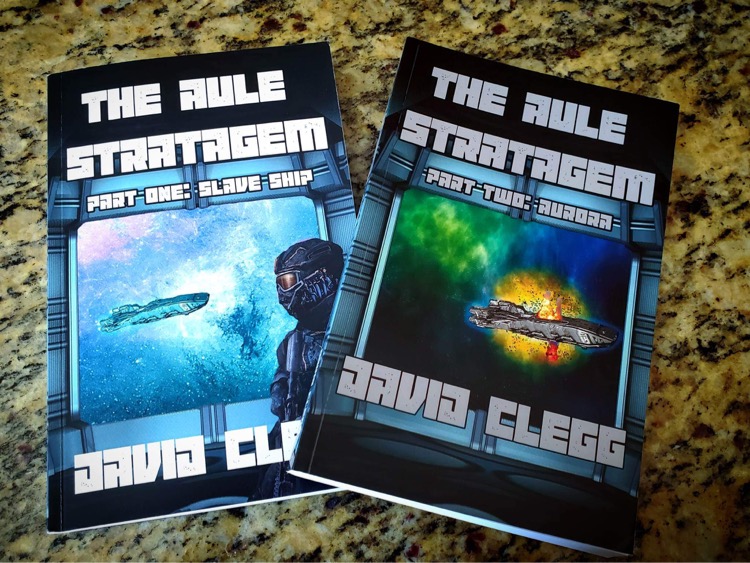

1. At what point do you think someone should call themselves a writer?
This is a controversial one on social media, although I’ve never really understood why. A writer writes, so if you write – you’re a writer. Being published or not doesn’t change it. Neither does what you write, be it poetry, novels, short stories, plays, or whatever. If you write, you’re a writer.
2. Do you like to create books for adults?
My books are intended for adults. Younger people can read them, and I’ve avoided using foul language to make them more accessible, but the themes and ideas are adult ones. War, loss, grief, sacrifice, the burdens of command, with nothing shied away from.
3. Do you prefer ebooks, printed books, or audiobooks most of the time?
I used to be firmly against ebooks, but my wife got me a Kindle for my birthday one year and I never looked back. Ebooks are better in every way. You can have hundreds of books with you just by picking up one device. You can adjust the font size and apply adjustments for disabilities without needing additional aids. You can annotate without damaging a paper book, you can look up words you don’t know without going into another book, you can do so much more than you can with printed books. The ebook is to the printing press what the printing press was to the scriptorium.
4. Have you ever killed off a character your readers loved?
There’s a character death in Slave Ship that hit some of my readers hard. I won’t spoil it, but it’s not foreshadowed at all and really comes out of nowhere. I always intended to do it, it was part of the initial plan for the book, and it feeds into the themes I’m working with. It’s war, no one is safe, and the end can come at any time, for anyone.
5. How do you develop your plot and characters?
I’m at the extreme “plotter” end of the plotter-pantser scale. I write a detailed outline of the book before starting on the first page. I have a scene-by-scene guide for the whole book, right down to conversations between characters and how action scenes play out. This lets me get the writer’s block out of the way ahead of time, so when I start writing, if I get stuck, I can look back at the outline and remind myself what’s meant to be happening, and I can get back to it. Some writers will call this “rigid”or say it’s not creative, somehow, but everything in the plan has come from me. It’s all my ideas and my story. If I come up with a better idea as I’m working, I can change the plan. It’s for me and my benefit, not anyone else’s. No one else ever has to see it and no one is checking to see if I’ve followed it or not. The only thing that matters is the end result.
6. What do you think is the best way to improve writing skills?
Like any skill, writing needs to be practised and developed by feedback. Writers need a good group of critique partners to share work and get feedback on what works and what doesn’t. It’s easy to develop bad habits in writing and your critique partners will pick you up on it. Social media is the best place to find partners unless you know other writers in real life. There’s also writing groups meeting in places like libraries and book shops, writing courses and editors, but you’ll be paying for those last two.
7. What are your favourite series or series authors?
Bernard Cornwell, author of the Sharpe series, the Last Kingdom series, the Warlord Chronicles and many more is one of my biggest influences in terms of style. His action scenes are excellent, described in detail but still fast-paced and exciting. I’ve learned a lot from descriptions of Sharpe fighting French troops with his 1796-pattern heavy cavalry sword. David Weber, author of the Honor Harrington series, among others, is my biggest influence in terms of content. Fans of the series will recognise a fair bit in my books. The Honor Harrington series is fantastic space opera, with compelling characters and detailed action scenes. I highly recommend to military sci-fi fans everywhere.
8. What books did you grow up reading?
A lot of my childhood reading was the Star Wars “expanded universe” novel series. I had virtually everything that was published up to the prequel films coming out and the changes starting to be made to the established history of the Star Wars galaxy. I also read Sharpe, the Warlord Chronicles, Jurassic Park, The Hobbit and the Lord of the Rings, Dennis Wheatley’s satanic horror novels, the Dune series, A fair bit of Tom Clancy, A Song of Ice and Fire, the Sword of Truth, and quite a few other things I can’t remember right now. I’m sure you can recognise a pattern.
9. What’s your writing software of choice?
I work in OpenOffice these days, and I have for some years. I previously used MS Office, in the days before it was a subscription service and you only had to buy it once, but my PC got infected with nasty malware and I had to start working on my wife’s laptop, so the free package was the way forward. OpenOffice Writer does everything MS Word and similar packages do, but it’s free and always will be. I remember an advertising campaign from my childhood used the slogan “why pay more?” and I think that’s very apt. There’s loads of great packages out there, at varying price points, but if there’s one that does what I need for free, well, I’ll take that any day of the week.
10. When did you write your first book and how old were you?
I started working on a fantasy novel in my late teens or early twenties, but I didn’t get very far into it. I’ve still got that setting and storyline in my notes folder, but the actual work was lost with the nasty malware already mentioned. The Aule Stratagem is my first finished novel. I started working on that on 2015 or so, when I was 32. It took me five years to get it to a query-ready state, and it was published in 2021 – or the first half of it was, anyway. My publisher, CAAB Publishing, split it into two volumes due to its length, 130,000 words when I sent them the full manuscript. It would have been too big, and thus, too expensive, for an unknown author to sell effectively. So the first part, Slave Ship, was released in September 2021 and the second part, Aurora, in June 2022.